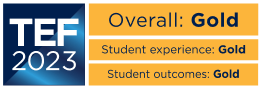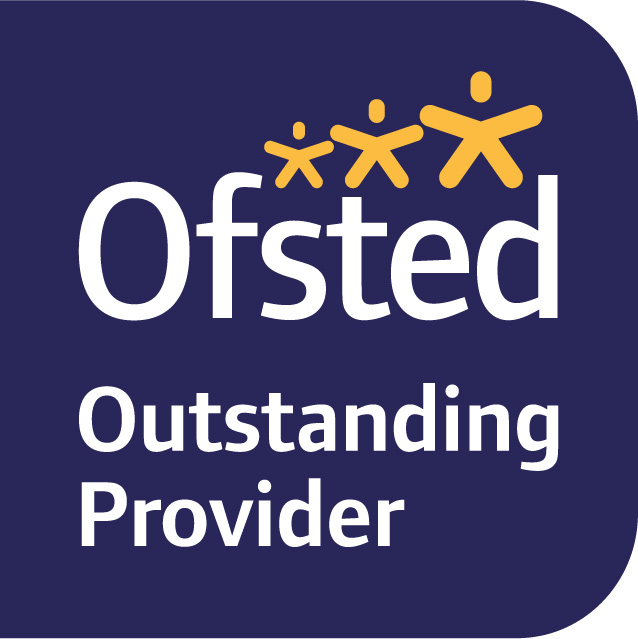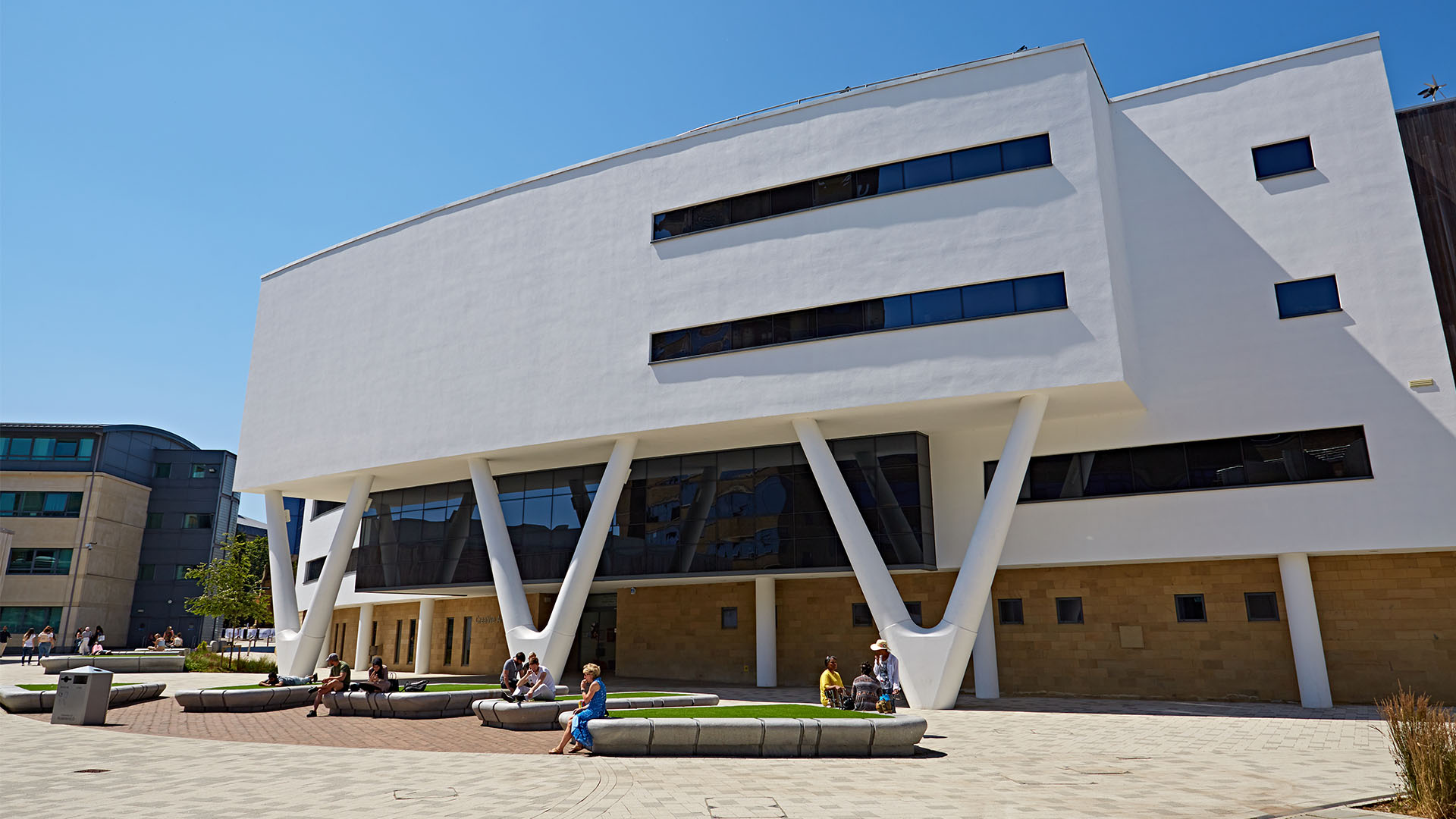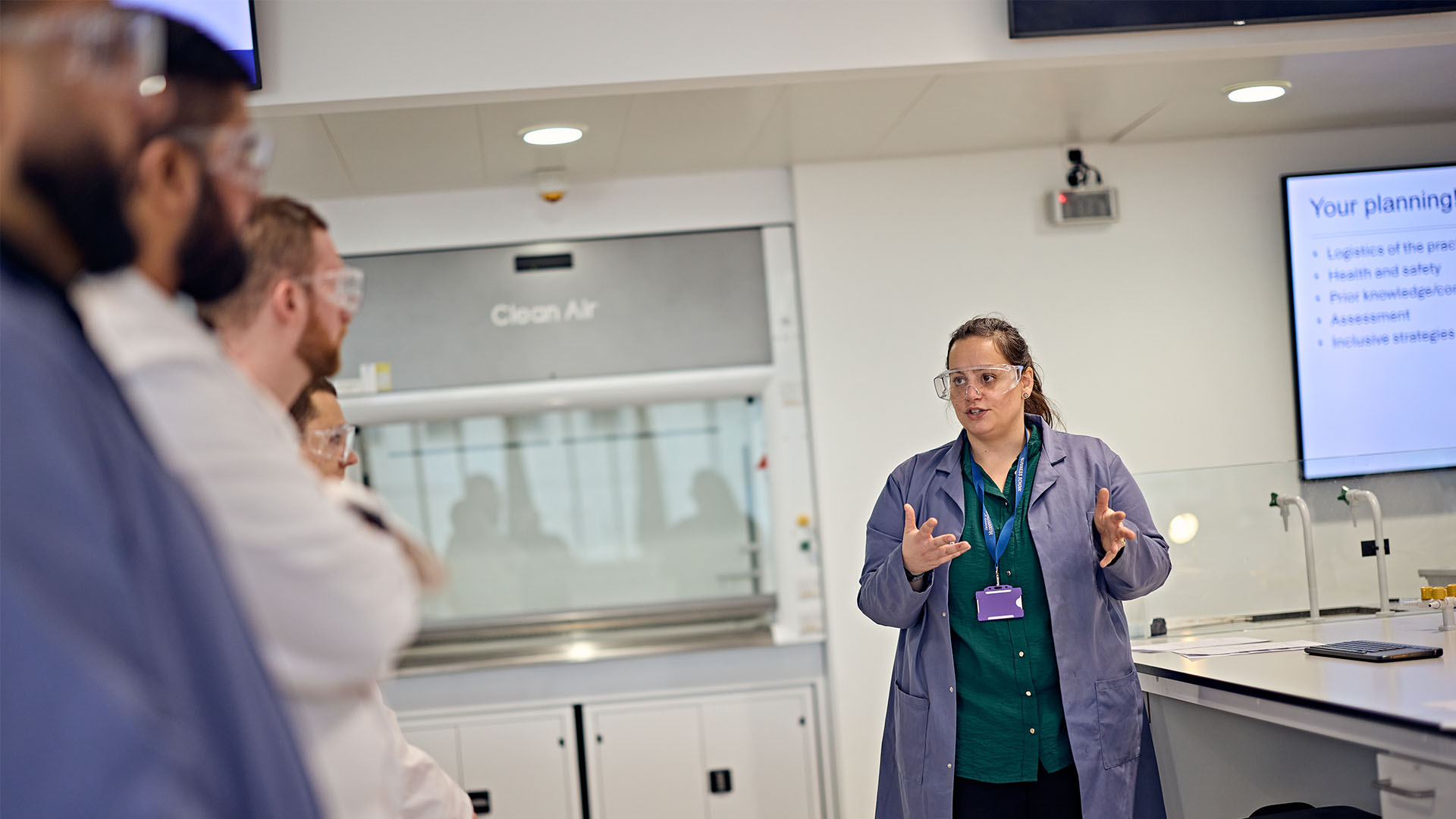
Mathematics Teaching (Secondary) with QTS (Teacher Degree Apprenticeship) BA(Hons)
This apprenticeship is employer led: applications must be submitted by employers on behalf of their staff.
Start Dates
21 September 2026
Duration
4 years full-time
UCAS Tariff
96
Eligibility Criteria
Permanent Employment in relevant field
Overview
Why choose Huddersfield for this course?
- Earn while you train. You’ll be employed in a secondary school from day one, earning a salary while your tuition fees are fully funded as you work tow
- You’ll spend most of your time teaching in school, supported by an experienced mentor, alongside university based learning that applies directly to th
- You’ll study with a Department for Education–approved provider, rated Ofsted ‘Outstanding’, with the highest Apprenticeship Qualification Achievement
The Teacher Degree Apprenticeship – Secondary Maths is an innovative, fully funded route into secondary teaching, enabling you to earn a salary while studying for an undergraduate degree and achieving Qualified Teacher Status (QTS). This is the only teacher training route that covers tuition fees while paying you a salary. Designed for aspiring secondary mathematics teachers, this employment-based apprenticeship allows you to work in a school from day one, gaining hands-on experience while learning from expert university tutors and school mentors.
Throughout the apprenticeship, 60% of the time is spent in the classroom, gaining practical experience with support from a specialist school-based mentor, while 40% is dedicated to off-the-job training at the university.
If you’re thinking of studying an apprenticeship, or are an employer looking for an apprenticeship for your employees, you’ll also find useful information on our Degree Apprenticeship webpages.
Why the University of Huddersfield?
- Teaching is one of the most fulfilling careers, offering the chance to shape lives, spark curiosity, and make a lasting impact. We’ve been developing great teachers in Huddersfield since 1947. The University of Huddersfield is one of only eight universities in England—and the only institution in Yorkshire—selected by the Department for Education to deliver this apprenticeship. The University of Huddersfield has the highest Apprenticeship Qualification Achievement Rate (QAR) among Higher Education Institutions in England.* (*Excludes providers with fewer than 100 apprentices)
- Our 2023/24 QAR was 87.6% and coupled with our Ofsted ‘Outstanding’ rating displays the excellent learning experience for apprentices and their employers at the University of Huddersfield.
- Co-developed with school and education professionals, the apprenticeship ensures that you gain specialist mathematics knowledge, strong pedagogical skills, and practical classroom experience to become a confident and highly skilled teacher.
What you'll study
Throughout the Teacher Degree Apprenticeship – Secondary Maths, you'll explore a rich and dynamic curriculum designed to develop both your subject knowledge, build your confidence and teaching skills.
- Designing Learning and Assessment for Secondary Mathematics – Learn how to plan, structure, and assess engaging mathematics lessons that meet the needs of all learners.
- The Science of Mathematics Learning – Explore how students learn maths, including cognitive processes and strategies for improving understanding and retention.
- Inclusivity in Mathematics Teaching Practice – Develop the skills to support diverse learners, ensuring that every student can succeed in mathematics, regardless of background or ability.
- Advanced Mathematical Knowledge at Key Stages 3 and 4 – Deepen your understanding of core and advanced maths concepts, equipping you with the confidence to teach topics across the 11-16 age range.
- Curriculum Planning and Progression in Mathematics – Discover how the maths curriculum is structured, enabling you to plan lessons that build on students' prior knowledge and prepare them for future learning.
- Enhancing Mathematics Education at Secondary Level: Work-Based Research Project – Apply what you’ve learned by conducting a real-world research project, helping to shape innovative teaching strategies in your school.
These modules, combined with hands-on classroom experience and expert university tuition, will equip you with the knowledge, skills, and confidence to thrive as a mathematics teacher. Upon completion, you will be fully qualified to teach mathematics to students aged 11-16, inspiring you to make an impact in classrooms from the very start of your career.
Entry Requirements
- CCC at A Level with grade C or above in A-level Mathematics, Core Mathematics, Further Mathematics or other cognate subject including Accounting, Physics, Statistics, or Chemistry.
- 96 UCAS tariff points from a combination of Level 3 qualifications including grade C or above in A-level Mathematics, Core Mathematics, Further Mathematics or other cognate subject including Accounting, Physics, Statistics, or Chemistry.
- Distinction at T Level in Accounting; Design and Development for Engineering and Manufacturing; Engineering, Manufacturing, Process, and Control; or Maintenance, Installation, and Repair for Engineering and Manufacturing.
- 96 UCAS tariff points from International Baccalaureate qualifications including scores of 4 or above in all mathematics and science components undertaken.
Applicants for the Teacher Degree Apprenticeship must:
- have been a resident of England for at least the last three years;
- not already have an undergraduate degree; and
- be aged 18 years or over at the commencement of the course.
You must hold and provide evidence of GCSE English Language and Maths at grade 4 or above, or grade C or above if awarded under previous GCSE grading scheme or equivalent, before the start date of your apprenticeship.
Those who do not have a GCSE in English Language, Literature or Mathematics may demonstrate an equivalent standard by completing a test via Equivalency Testing or A Star Equivalency and achieving at least a grade 4. For Mathematics, equivalency tests in Mathematics Foundation or Mathematics Higher with grade 4 are accepted.
Level 2 BTEC, Functional Skills or Access course qualifications are not accepted in place of GCSEs.
Level 3 qualifications should have been achieved within the last 5 years unless applicants can demonstrate recent professional experience in a mathematics-related field for example mathematics education, accounting or finance.
Accreditation of Prior Experiential Learning
Applicants without a Grade C or above in A-Level Mathematics, or an equivalent as specified above, may also be eligible to undertake the course. Such applicants are invited to apply for Accreditation of Prior Experiential Learning (APEL) if they can evidence working in a mathematics-related field. At least three years of relevant experience will ordinarily be expected, but APEL applicants with a minimum of one year of experience and other evidence of mathematical learning will be considered on a case-by-case basis. To be eligible to submit an APEL claim, applicants must hold Level 3 qualifications equivalent to 96+ UCAS Tariff Points, in any subjects.
You will need a satisfactory enhanced Disclosure and Barring Service (DBS) and occupational health clearances prior to registration on the course. You will be required to sign a self-declaration at the start of each year and at the end of the course. All police contact during the course must be reported to the course leader as a matter of urgency and may lead to suspension or termination.
If your first language is not English, you will need to meet the minimum requirements of an English Language qualification. The minimum of IELTS 7.0 overall with no element lower than 6.5, or equivalent. Read more about the University’s entry requirements for students outside of the UK on our International Entry Requirements page.
For further information please see the University's minimum entry requirements.
Course Details
Teaching and Assessment
Discover what to expect from your tutor contact time, assessment methods, and feedback process.
Fees and Finance
As an apprentice, there is no tuition fee to pay for the higher or degree apprenticeship. Tuition fees are covered by your employer and the government through the Levy. As you'll be a paid employee, you are not able to take out a student loan.
Are you an employer? You’ll find lots of information about how apprenticeships are funded via the levy on our Degree Apprenticeship webpages.
If you require further information, please contact apprenticeships@hud.ac.uk
Scholarships and Bursaries
Discover what additional help you may be eligible for to support your University studies.
Tuition Fee Loans
Find out more about tuition fee loans available to eligible undergraduate students.
What’s included in your fee?
We want you to understand exactly what your fees will cover and what additional costs you may need to budget for when you decide to become a student with us.
If you have any questions about Fees and Finance, please email the Student Finance Team.
Gallery
Take a look at the Charles Sikes and Richard Steinitz Buildings, where your lectures and seminars will take place.
Explore More
Why Hud
Explore the unique opportunities and resources that make our institution a top choice for students seeking a well-rounded and future-focused education.
More Info
Careers support
We know you’re coming to university to study on your chosen subject, meet new people and broaden your horizons. However, we also help you to focus on life after you have graduated to ensure that your hard work pays off and you achieve your ambition.
Find out more about careers supportStudent support
At the University of Huddersfield, you’ll find support networks and services to help you get ahead in your studies and social life. Whether you study at undergraduate or postgraduate level, you’ll soon discover that you’re never far away from our dedicated staff and resources to help you to navigate through your personal student journey.
See our support servicesTeaching Excellence
Great teaching is engaging and inspiring — it helps you reach your full potential and prepares you for the future. We don’t just teach well — we excel — and we have the awards and recognition to prove it.
Find out moreInspiring Academics
Our researchers carry out world-leading work that makes a real difference to people’s lives. Staff within the School of Education may teach you on this course.
Find out more about our staffResearch Excellence
You’ll be taught by staff who want to support your learning and share the latest knowledge and research.
Find out moreAccommodation
Looking for student accommodation? Huddersfield has you covered. HudLets has a variety of accommodation types to choose from, no matter what your preference. HudLets is the University’s approved accommodation service, run by Huddersfield Students’ Union.
Take a look at your optionsFurther Study
If you want to continue your learning beyond your undergraduate degree, there is a range of financial support available for postgraduate study, including discounts for Huddersfield graduates.
Discover postgraduate coursesLegal information
When you enrol as an apprentice learner of the University, your study and time with us will be governed by a framework of regulations, policies and procedures, which form the basis of your agreement with us. These include regulations regarding the assessment of your course, academic integrity, your conduct (including attendance) and our disciplinary procedure. It is important that you familiarise yourself with these as you’ll be asked to agree to them when you join us as an apprentice. You’ll find a guide to the key terms here, along with the Student Protection Plan, where you’ll also find links to the full text of each of the regulations, policies and procedures referred to.
Although we always try and ensure we deliver our courses as described, sometimes we may have to make changes for the following reasons:
Changes to a course you have applied for but not yet started
If we propose to make a major change to an apprenticeship course that you have applied for, then we will tell you and your employer as soon as possible so that you can decide whether to withdraw your application prior to enrolment.
Although we always try and run all the courses we offer, we may occasionally have to withdraw a course you have applied for or delay your course start date if we consider this reasonably necessary, for example if there are not enough applicants to ensure you have a good learning experience. Where this is the case we will notify you and your employer as soon as reasonably possible. In such instances, we will work with you and your employer to agree a deferred start date, or cancel your application and, if appropriate, provide information regarding other local apprenticeship providers.
Changes to your course after you enrol as an apprentice
We will only make major changes to the core curriculum of a course or to our services if it is necessary for us to do so and provided such changes are reasonable. A major change is a change that materially changes the services available to you, or the outcomes, or a significant part, of your course, such as the nature of the award or a substantial change to module content, teaching days, classes, type of delivery or assessment of the core curriculum.
For example, it may be necessary to make a major change to reflect changes in the law or the requirements of the University’s regulators; to meet the requirements of an updated version of the apprenticeship standard relevant to your course; to meet the latest requirements of a commissioning or accrediting body; to improve the quality of educational provision; in response to student, examiners’ or other course evaluators’ feedback; and/or to reflect academic or professional changes within subject areas. Major changes may also be necessary because of circumstances outside our reasonable control, such as damage or interruption to buildings, facilities or equipment.
In exceptional circumstances, we may, for reasons outside of our control, be forced to discontinue or suspend your course. Where this is the case, a formal exit strategy will be followed and we will notify you and your employer as soon as possible about what your options are, which may include being provided with individual teaching to complete the award for which you were registered or claiming an interim award and exiting the University.
If a major change affects your course, we will notify you and your employer as soon as possible and will carry out suitable consultation with affected apprentices. If you and your employer reasonably believe that the proposed change will cause you detriment we will work with both of you to try to find an appropriate solution. Where one cannot be found we will provide reasonable support to assist you with transferring your remaining apprenticeship learning to another training provider if you and your employer wish to do so.
Termination of employment
As your employer is funding your apprenticeship course, you must remain in relevant employment for the duration of the course until you have completed your end point assessment. Under the apprenticeship rules, if you are made redundant and you have completed 75% of the practical period or have less than 6 months left, then you may complete the course. Otherwise, unless you find alternative relevant employment within 12 weeks of the date you are made redundant, then you’ll be withdrawn from the course.
The Office for Students (OfS) is the principal regulator for the University. The ESFA is the principal regulator for your apprenticeship course.












